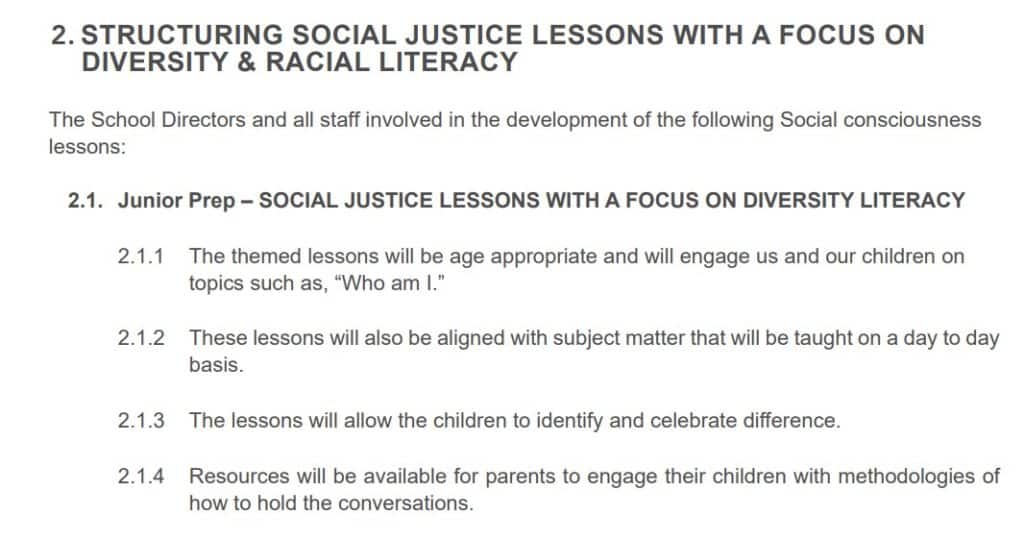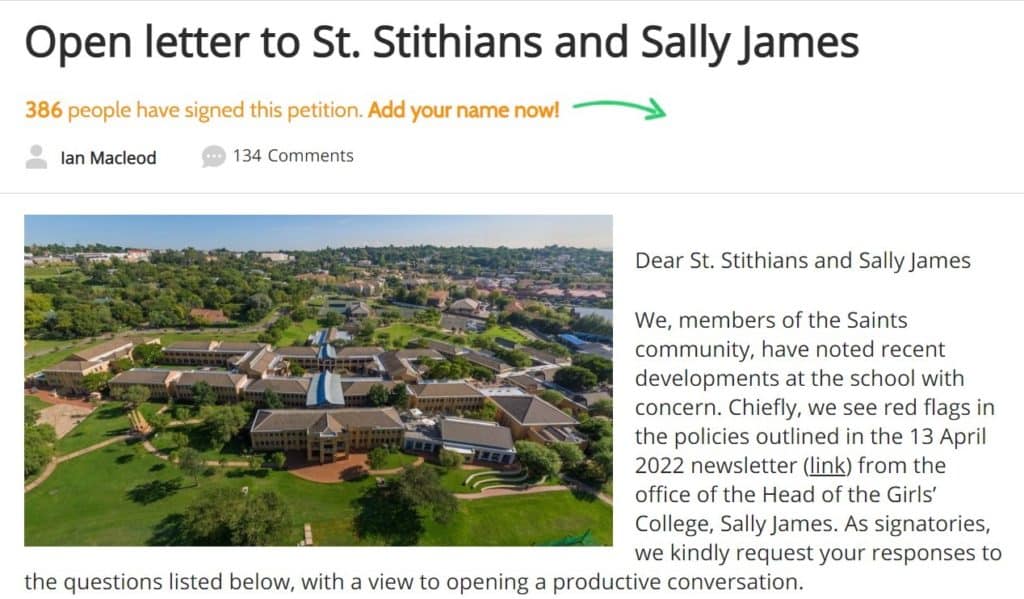‘Ian, you’ve kicked one hell of a hornets’ nest,’ I’ve been told by an insider. While my petition was strictly a list of probing questions, the grave assertions it carried were intentionally unhidden.
I argue that leaders at one of South Africa’s pre-eminent private schools have driven roughshod over governance and their contractual obligations to parents and pupils. That they have sown racial and sexual tension among kids. All inspired by radical and indefensible ideologies. The result has been to endanger children and bomb the foundations of an otherwise valuable institution. It is all happening in front of our eyes.
I’m merely an old boy of St. Stithians. (Of course, I’ve just committed what the school’s transformation gurus would call a gender micro-aggression. Saying ‘boy’ is a perilous risk among these types.) I remain a member in good (maybe good-ish) standing of the Old Stithian Association (OSA) but hold no office at the Johannesburg school. I’m told of grumblings that I’m sticking my nose where it doesn’t belong. An accusation I reject. When office bearers and committees and processes fail, going guerrilla is permitted. Obligated, sometimes.
Let me pause here to refer you to my initial piece on the topic, Requiem to a school: Goodbye, Saints, and to the petition I wrote. Those provide the context.
Here’s a summary. A newsletter of 13 April 2022 out of the office of St. Stithians Girls’ College headmistress, Sally James, announced a sweeping raft of policies, capital outlays and more on race, gender and sexuality. I saw a gross lack of evidence that governance had been followed, coupled with hallmarks of dangerous theoretical models crowding out logic.
The newsletter also announced the enrolment of a boy into the Girls’ College. I see this as a result of the process that I challenge. As an individual case, I reiterate that I have no inside knowledge of this child’s situation. I choose my words very carefully to keep the debate at the level of policy and leadership. This single admission decision is not the appropriate locus.
Red flags
Yes, I could easily have shrugged at developments and moved on. ‘Why are you getting involved?’ I get asked. In short, all the red flags of a woke takeover are fluttering above the grounds of the old Driefontein Farm in modern Bryanston. Each one with precedent for reliably signalling impending ruin. Evidence of ‘go woke, go broke’, if you like. But where ‘going broke’ can be far worse than losing money. Based on the many case studies from the US and beyond, this sort of radical takeover risks unleashing mania. We’re talking Satanic Panic-level group hysteria. At its worst, left to morph unobstructed, this is the very sort of force that is now producing young adults who were castrated as teenagers, only to realise they were victims of ‘mass formation psychosis’ and deluded adults.
Here are three of my questions and my reasons for asking them.
Question 1:

Question one needs little explanation. If you are implementing any policy of any importance, some guiding examples are a basic requirement. The policies in question cover topics including transgenderism among children. I see no evidence of robust analysis of appropriate case studies. No attempt to understand similar efforts and learn from them. And plenty of evidence of ideology bulldozing its way to action. That’s why we have governance.
These policies have been implemented many times over around the world in recent years. America is leading the charge. Many have gone very badly. The burden of proof is on the school to show that these policies work. But I’ll highlight just one risk. Radical gender theory can cause outbreaks of gender confusion. We’ve all seen how a meme can spread through a school. Often it is a hairstyle (the Peaky Blinders do seems to be the current craze). Yoyos come and go. On school camps, panic gets set off by one dude who swears he saw an axe murderer in the forest. These are perennial and pretty harmless examples. But gender dysmorphia runs on the same psychological rails. And off them.
Here I’ll quote from my Requiem piece:
There is robust evidence that schools that bring in transgender ‘education’ programmes cause viral spread of faux transgenderism. ‘Peer contagion‘ is the term. Much as teenagers all like the same (invariably terrible) fashion and haircuts, ‘transgenderism’ can spread virally. Girls in particular are prone to ‘outbreaks’ of this so-called ‘rapid-onset gender dysphoria‘. Brown University’s Lisa Littman coined that phrase in her peer-reviewed work. Children who don’t suffer gender dysphoria are vulnerable to getting caught up in this emotional contagion. Like any field, this is a living question. It is rich with uncertainty. Too much to entrust its management to teachers in schools with untested models. Certainly not without far more evidence than has been provided.
At its worst, youngsters take puberty blockers and undergo gender reassignment surgery, only to regret it and ‘detransition‘. This is not to suggest that transgenderism should not be addressed in schools, or that doing so will always lead to transgender hysteria, or that such a scenario will always lead to surgery and attempts to undo it. Rather, this is to highlight the danger of substantial numbers of people who regret terribly what surgeons have done to them in the name of finding some elusive utopia of total comfort as regards sexuality. And to question the role a school ought to play in this arena. It is not a stretch to call the current atmosphere obsessive. Race, gender and sexuality seem to have monopolised the public square.
We deserve evidence that policymakers have explored these risks.
Question 2:

Wherever race, gender, and sexuality become major issues at a school, some very worrying theoretical models have emerged as underlying drivers. Saints has failed to outline the underpinnings of their policies. They make claims that amount to ‘we are doing inclusivity, that is always good, and these are the ways we’re doing it – now get on board’. That is insufficient. There are signs that critical race theory (CRT) and similarly destructive, bogus ideologies are inspiring this radical thinking across the leafy campus.
Control
This paragraph can be extended to cover critical gender theory. Call anything you want to control ‘sexist’ until you control it.
For balance, here’s a gentler (and inaccurate) definition from Brookings of what CRT addresses: ‘social institutions (e.g., the criminal justice system, education system, labor market, housing market, and healthcare system) are laced with racism embedded in laws, regulations, rules, and procedures that lead to differential outcomes by race.’ This informs the study of CRT in places like American law schools, where the early thought on this emerged. In that context, there is some justification for some aspects of CRT.
What is uniform across these so-called critical theories is a thinly veiled Marxism. People are no longer treated as individuals. Your child is black or gay or privileged long before he or she is an individual.
Admitting a boy to a girls’ school tacitly makes a deeply problematic allegation of sexism. It says to parents and pupils who oppose this, that they are sexist in their refusal to acknowledge that a transgender girl (a biological boy who believes he is a girl and wishes to live like ‘as a girl’) is a girl. That he is a girl in every way, regardless of biology.
The first question to ask is how any boy might know what it feels like to be a girl. He can’t. Of course, he may be feminine. Some men are more feminine than some women. No problemo. He may be gay. Alrighty. But to deem a boy a girl because he thinks he feels like one is indefensible. One must ask if these schools attempt to defend it in, say, biology class. ‘Sir, can a female produce sperm?’
This all reduces to absurdity at breakneck speed. It is perfectly consistent with radical gender theory for a ‘trans girl’ to complain of tummy aches and be diagnosed by the doctor as having menstrual cramps. Likewise for a 104kg 18-year-old boy to join the girls’ rugby team. People ought to be fine with a 15-year-old girl showering with the under-16 boys’ rowing eight. You can plug in your own examples of how dangerous and preposterous this gets. That’s why we have governance.
Contractual issue
Practically, this speaks to a simple contractual issue. Parents who pay R150 000-plus a year to send their daughters to a girls’ school gain certain contractual rights. Saints would have us believe that ‘girls’ ought to be interpreted as covering both biological girls and biological boys who believe they are girls and choose to live ‘as girls’. As a straightforward contractual matter, that is untenable.
Question 3:

Everything has a cost. Everything. Even if ideologues deny it. When you’re captured by ideology, no expense can possibly stand in the way of validating your heartfelt beliefs. Balance sheets are too boring. That’s why we have governance.
Parents ought to know how much all of this is costing them. There is a great deal of talk about racial sensitivity workshops, gender consultants, and even infrastructure spend. Legal fees abound for disciplinary proceedings. Anyone plugged into the private school network knows of dozens of disputes. Racial allegations seem to predominate. Mispronounced names become prolonged battles. As it stands, we can only speculate on the figures. If I was handing over R150,000-plus every year, I’d like to know them. I’d demand them.
It would be useful to put these expenses in terms of the opportunity costs. How many years of school fees for one youngster are sacrificed for gender-neutral showers? How many hours of teaching must each educator give up in order to be trained in identifying ‘gender micro-invalidations’ in 9-year-old boys?
Perhaps the most egregious cost is the hardest to calculate. Obsessing over race, gender and sexuality has unintended consequences. (Well, sometimes I think they are deviously intended.) It creates antagonism. Stress. Suddenly a young lad rough-n-tumbling with a buddy is a micro-aggression, demanding counselling to rein in his ‘toxic masculinity’ – another phenomenon invented by gender grievance PhDs.
Act of white privilege
Next we may be told that owning an expensive phone is an act of white privilege. A teacher with no relevant training or mandate steps in, dousing the trivial matter with pseudo-science and toxic emotion. All the while the lad who needs help to get the B he needs for maths is right out of luck. Getting into engineering is so passé.
One struggles to find an event, workshop, or speech that isn’t infused with race, gender, and sexuality. Worse, there is plenty of evidence that academic time is giving way to the obsession with ‘social justice’. Here the red flag is ‘social emotional learning’. This sounds upbeat and positive. It is not. SEL amounts to penetrating every lesson with division, junk science, historical deceit, and tension. Maths examples are designed to denounce heteronormativity. Biology classes attempt to groom LGBTQ+ allies. Shakespeare reading is hijacked and weaponised for BLM. The results show up in a small but telling way in the school’s own transformation materials, where spelling and grammar take a back seat. Keep an eye open for this.
The screen grab below is evidence that the above paragraph is not just a sample of typical global happenings. This sort of thinking is happening in classrooms across the Saints campus. ‘Social justice lessons with a focus on diversity & racial literacy’ – at the Junior Prep. Why?

Where does this leave us? As it stands, I have posed 16 questions in my petition, earned the endorsement of nearly 400 signatories, and received zero answers. Why do you think this is?
What’s next from me? I just know stuff and ask questions. That’s my role. I’ll keep doing that. But I hold no voting power. Parents and pupils have that. I have suggestions for them.
Read my content. Don’t trust me, though. Go to the sources. Read the original materials. Apply your mind to the Saints diversity and transformation website: https://www.stithian.com/content/page/diversity-and-transformation. Read that carefully. If you agree that we deserve answers, sign the petition. But don’t stop there.

Press for answers. Speak to the head of your child’s school. Ask for lesson plans. If that data is refused, demand it. Ask your children if they feel as if teachers are obsessing over race or making them uncomfortable with sexual content. Speak to teachers. Ask them how much time they spend putting in extra time without pay to perform work unrelated to the task of educating your kid.
If you’re not satisfied with the answers, remove management. Vote them all out. Seek out the sort of talent that follows governance. Find leaders that can spot bogus theories. Pay administrators that respect your rights to information and participation.
Most importantly, don’t be cowed. Ideologues are good at producing social scorn. They’ll attempt to cast you as a bigot if you want accounts on spending on mixed-sex showers. They’ll call you racist if you don’t want a maths teacher in all-day intersectionality workshops. And they will try to convince you that you’re backward if you question them. Do your research. Stick to your guns. You’ll be bulletproof. Hornet proof.
[Image: https://www.roundsquare.org/school/st-stithians-girls-college/]
The views of the writer are not necessarily the views of the Daily Friend or the IRR
If you like what you have just read, support the Daily Friend


